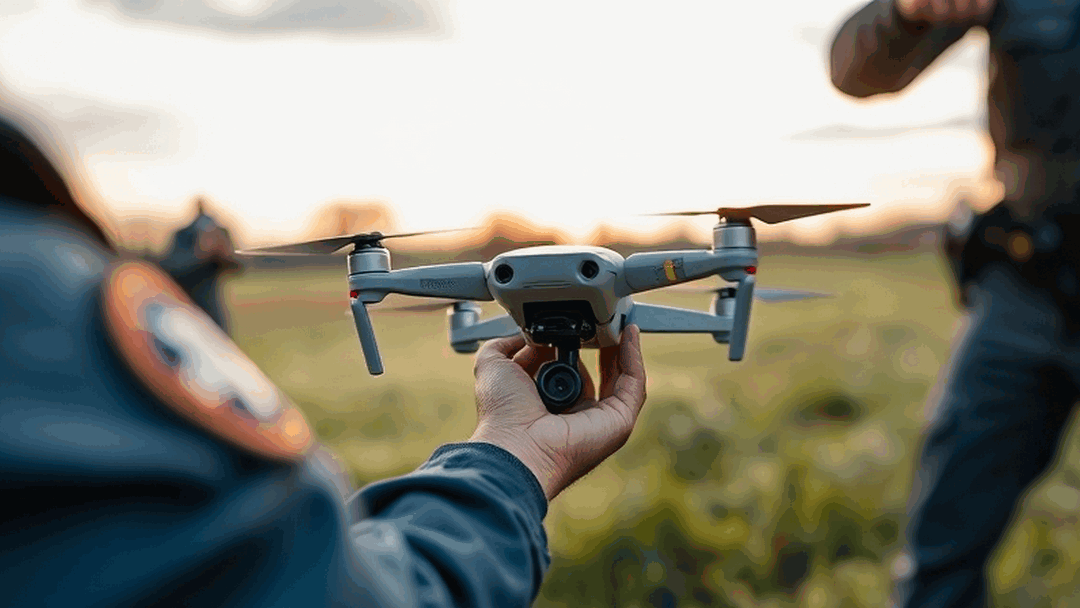Someone asked us… Can the police take my drone?
As we have seen … They can charge, arrest you and take your stuff for whatever they want. You’ll have to fight it out in court to get it back.
In Michigan, the police can confiscate your drone under certain conditions, mainly if you’re violating the law.
Here’s what you need to know about when and why your drone might be taken by authorities.
—> There’s some cool drone shows at the end of this article.
Illegal Use of Drones
If you’re using your drone in a way that breaks Michigan or federal laws, the police can step in. For example, Michigan law (MCL 259.322) prohibits using drones to interfere with law enforcement, harass others, or invade privacy. If your drone is involved in these activities, the police can seize it as part of their investigation.
Under MCL 259.322, it is illegal to operate a drone in a way that interferes with law enforcement or emergency operations. Flying a drone over prisons, for example, is strictly prohibited. Violating these laws could lead to arrest, fines, or both.
Trespassing
Flying a drone over private property without permission could be considered trespassing. Michigan law (MCL 259.320) regulates the safe operation of drones, and if you violate airspace laws or property rights, your drone could be confiscated as evidence of trespassing or other violations.
259.320 Criminal liability; offense committed with aid of an unmanned aircraft system; exception.
Sec. 20.
(1) A person is guilty of an offense committed with the aid of an unmanned aircraft system if the unmanned aircraft system is under the person’s control and the activity performed with the aid of the unmanned aircraft system would have given rise to criminal liability under the penal law of this state if it was performed directly by the person without the aid of an unmanned aircraft system.
(2) Notwithstanding subsection (1), and except as provided in sections 21 and 22 and section 45a(1) of the Michigan penal code, 1931 PA 328, MCL 750.45a, solely flying an unmanned aircraft system through navigable airspace in accordance with federal law does not give rise to criminal liability under the penal law of this state.
The Key sentence from above: “solely flying an unmanned aircraft system through navigable airspace in accordance with federal law does not give rise to criminal liability under the penal law of this state.”
-So if you use the drone in aiding you to commit a crime – The trouble begins (or maybe just an alleged a crime to sieze it). See you in court.
National Security Concerns
Flying drones near airports, military bases, or other restricted areas can lead to immediate police action. The Federal Aviation Administration (FAA) has strict rules about no-fly zones, and Michigan police will work with federal authorities to confiscate drones that pose a national security risk.
Use You Right To Remain Silent
If you have been accused or charged with a crime.
Say nothing to anyone. Talk to us first.
Our firm is experienced in both State and Federal courts defending clients.
CALL NOW
Accidents or Dangerous Flying
If your drone causes an accident or is flown recklessly, the police can confiscate it to prevent further harm or investigate the incident. This is especially relevant if someone is injured or property is damaged.
Do I Need to Be Licensed?
If you’re flying a drone for commercial purposes, you must have an FAA Part 107 Remote Pilot Certificate. To get this, you’ll need to pass a knowledge test administered by the FAA.
If you’re flying for recreational purposes, you don’t need a license, but you must follow FAA safety guidelines, including flying below 400 feet and keeping the drone within your line of sight.
Do FAA Laws Supersede Local Laws?
Yes, Federal Aviation Administration (FAA) laws take precedence over state or local drone regulations.
This means that federal rules about airspace, drone registration, and licensing apply across the country, including Michigan. However, local laws that don’t conflict with FAA rules—like those concerning privacy or property—can still apply.
Michigan State Laws:
In Michigan, there are no separate state registration requirements for drones beyond the FAA’s regulations. However, local ordinances may still apply, particularly regarding where you can fly the drone, so it’s important to check local rules.
Disclaimer: This article provides a general overview and does not substitute for legal advice. As with any law it can change or be modified and research should be done before you rely on any information provided on the internet. Although we make all attempts to link relevant laws these laws can often be gray and corrupted to fit a narrative. Anyone charged with any alleged crime should consult an attorney for specific legal guidance.
Beautiful when they are used for good…
Michigan Laws
Client Was Caught With Brass Knuckles – What’s the Law?
Michigan Criminal Laws FAQs Brass KnucklesGetting caught with brass knuckles in Michigan can lead to serious legal trouble. While some states have more lenient laws, Michigan takes a strict stance on these types of weapons. If you or someone you know faces charges...
Resisting an Unlawful Arrest in Michigan
Michigan Criminal Laws FAQs Resisting an Unlawful Arrest in MichiganThe question of whether you can legally resist an unlawful arrest in Michigan is complex, and the answer is generally no, with very limited exceptions. While the idea of defending oneself against an...
Criminal Law FAQs – Assault with Intent to do Great Bodily Harm Less Than Murder (AWIGBH)
Michigan Criminal Laws FAQs Assault with Intent to do Great Bodily Harm Less Than MurderAccording to Michigan State Law (Michigan Compiled Laws - MCL), Assault with Intent to do Great Bodily Harm Less Than Murder (AWIGBH) is a serious felony offense defined in MCL...
Criminal Law FAQs – Operating a Vehicle with a High BAC
Michigan Criminal Laws FAQs Super Drunk (High Breath Alcohol Content)Operating a Vehicle with a High BAC (Super Drunk) - MCL 257.625(1)(c)FAQ 1: What BAC level qualifies as "High BAC" or "Super Drunk" in Michigan? Answer: In Michigan, operating a vehicle with a blood...
Criminal Law FAQs – Bench Warrant
Michigan Criminal Laws FAQs Bench WarrantsAccording to Michigan State Law (Michigan Compiled Laws - MCL), a Bench Warrant is a court order that directs law enforcement officers to arrest and bring a specific individual before the court. It's issued by a judge (from...
Criminal Law FAQs – Traffic Offenses
Michigan Criminal Laws FAQs Traffic OffensesAccording to Michigan State Law (Michigan Compiled Laws - MCL), Traffic Offenses encompass a wide range of violations related to the operation of motor vehicles on public roads and highways. These offenses are primarily...
Criminal Law FAQs – Drunk and Disorderly
Michigan Criminal Laws FAQs Drunk and DisorderlyAccording to Michigan State Law (Michigan Compiled Laws - MCL), there isn't a specific statute that solely defines "Public Drunkenness" as a statewide criminal offense in the same way some other states might have a...
Criminal Law FAQs – Drinking Alcohol or Smoking Marijuana and Driving
Michigan Criminal Laws FAQs Operating a Motor Vehicle Under The InfluenceWalking is cool... For fun and excercise. Not because you lost your license. Don't do the crime if you can't pay the price. But if you do get charged with a crime. Better Call Komorn to fight for...
Criminal Law FAQs – Probation Violations
Michigan Criminal Laws FAQs Theft CrimesAccording to Michigan State Law (Michigan Compiled Laws - MCL), a Probation Violation occurs when a person who has been sentenced to probation fails to comply with the terms and conditions of their probation order. These terms...
Criminal Law FAQs – Theft Crimes
Michigan Criminal Laws FAQs Theft CrimesAccording to Michigan State Law (Michigan Compiled Laws - MCL), Theft Crimes generally involve the unlawful taking of someone else's property with the intent to deprive them of it, either permanently or for a significant period....



















